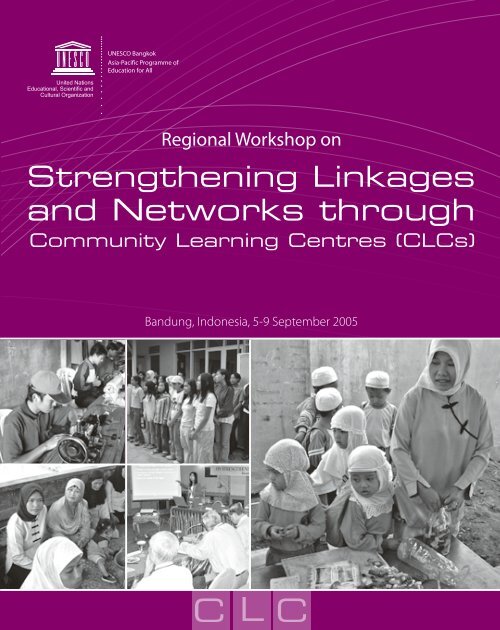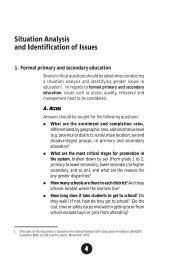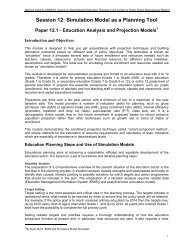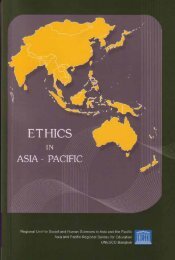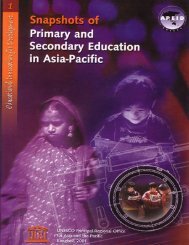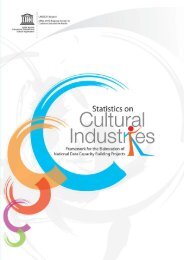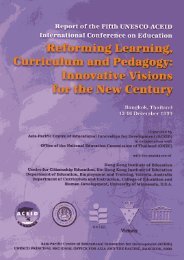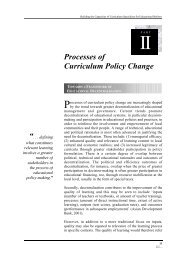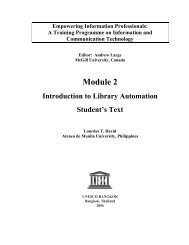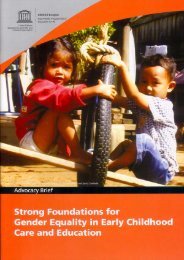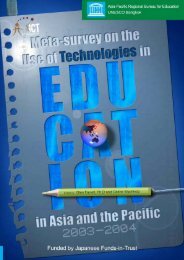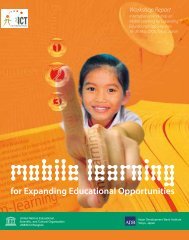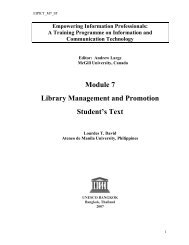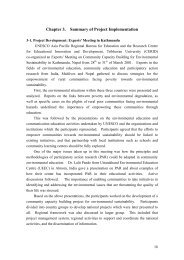Download PDF - UNESCO Bangkok
Download PDF - UNESCO Bangkok
Download PDF - UNESCO Bangkok
Create successful ePaper yourself
Turn your PDF publications into a flip-book with our unique Google optimized e-Paper software.
<strong>UNESCO</strong> <strong>Bangkok</strong>Asia-Pacific Programme ofEducation for AllRegional Workshop onStrengthening Linkagesand Networks throughCommunity Learning Centres (CLCs)Bandung, Indonesia, 5-9 September 2005
Regional Workshopon StrengtheningLinkages andNetworks throughCommunity LearningCentres (CLCs)Bandung, Indonesia5-9 September 2005
Regional workshop on strengthening linkages and networks throughCommunity Learning Centres (CLCs), Bandung, Indonesia, 5-9 September 2005.<strong>Bangkok</strong>: <strong>UNESCO</strong> <strong>Bangkok</strong>, 2006.20 pp.1. Community learning centres. 2. Adult learning. 3. Lifelong education.4. Information network. 5. Workshops.ISBN 92-9223-090-5Photo credit:© <strong>UNESCO</strong> / K. Jin© <strong>UNESCO</strong> 2006Published by the<strong>UNESCO</strong> Asia and Pacific Regional Bureau for Education920 Sukhumvit Rd., Prakanong<strong>Bangkok</strong> 10110, ThailandPrinted in ThailandThe designations employed and the presentation of material throughout thepublication do not imply the expression of any opinion whatsoever on the part of<strong>UNESCO</strong> concerning the legal status of any country, territory, city or area or of itsauthorities, or concerning its frontiers or boundaries.APL/06/OS/29-300
Table of ContentsPrint VersionIntroduction 1Proceedings 3Annex 1: List of Participants 14Annex 2: Workshop Programme 16CD AttachmentIntroductionChapter 1: ProceedingsChapter 2: Overview of EFA, APPEAL Strategies and CLCsChapter 3: Sharing Country ExperiencesChapter 4: Field VisitsChapter 5: Identifying Key Strategies for Establishing, Maintaining andExpanding CLC NetworksChapter 6: Developing Strategies for Effective CLC Network ModelsChapter 7: Developing Strategies for Setting Up Regional/National CLCNetworksChapter 8: Country Action PlansPhotos from Opening (Day 1) and Field Visits (Day 2)Country Study Reports on Linkages and Networking of CLCsPresentations and InformationAnnex 1: List of ParticipantsAnnex 2: Workshop ProgrammeAnnex 3: List of ARTC and LRC membersAnnex 4: Opening Speech by Indonesian Minister of Education
IntroductionBackgroundThe ProjectThe Community Learning Centre (CLC) Project has been carried out since1998 within the framework of the Asia-Pacific Programme of Education forAll (APPEAL). The CLC is a multi-purpose learning centre that serves as alocal venue for adults, youth and children to engage in all kinds of learningthrough literacy and continuing education. It also serves as a vehicle andmedium for acquiring the information, knowledge and skills essential forhuman growth. As of 2005, CLCs have been introduced into 22 countriesthroughout the region, namely Bangladesh, Bhutan, Cambodia, China,India, Indonesia, Iran, Kazakhstan, Kyrgyzstan, Lao PDR, Malaysia, Mongolia,Myanmar, Nepal, Pakistan, Papua New Guinea, the Philippines, Samoa, SriLanka, Thailand, Uzbekistan and Viet Nam.After a few years’ implementation of CLCs, these countries have expressedpositive views about them as important delivery mechanisms for literacyand continuing education. At the same time, many of them have reportedthat the activities are often limited to education. In fact, CLC activities shouldinclude those related to health, agriculture and community development.Thus, NFE/CLC personnel need to improve their skills in establishing contactsand networking with agencies from various sectors other than education,including those in the private sector, for the purpose of communitydevelopment and improving the quality of life.In view of the above background, the project on linkages and networksthrough CLCs has been launched under the Japanese Funds-in-Trust (JFIT)and the <strong>UNESCO</strong> Regular Programme Budget.The main objective of this project is to assist countries in the region todevelop CLCs as coordinating agencies of local networks that link with theprivate sector, development organizations of governments and NGOs, andacademic and research institutions, such as universities.Specifically, the project has the following objectives:• To identify successful field experiences related to effective local networksand linkages through CLCs for community development in countries of theregion;• To organize a regional forum to share the above field experiences andformulate the framework of pilot projects;• To assist in carrying out pilot projects in participating countries todemonstrate local innovative approaches for strengthening networks andlinkages; and• To review the experiences of participating countries and share the findingswith other countries in the region, especially those with CLCs.
As the first activity under this project, APPEAL has supported Bangladesh,China, Japan, Indonesia, the Philippines and Thailand in undertakingresearch studies to identify different models for establishing CLC networks.The WorkshopWithin the framework of this project, a regional workshop on strengtheninglinkages and networks through CLCs was held in Indonesia during 5-9 September 2005. It was organized in collaboration with the CLCCommunication Forum, the Ministry of Education and <strong>UNESCO</strong> Jakarta.The overall objective of the workshop was to discuss and explore strategiesto further strengthen CLCs as effective delivery mechanisms for literacy andcontinuing education programmes and for community development withinthe framework of the national EFA action plans, national development plans,and the United Nations Literacy Decade (UNLD). The specific objectives wereas follows:• To share research findings on the different models used in participatingcountries for establishing CLC linkages and networks;• To identify strengths and weaknesses in establishing CLC linkages andnetworks with various organizations and sectors;• To obtain experiences through study visits in the host country in areasrelated to CLC linkages and networks;• To develop practical strategies for establishing effective CLC linkages andnetworks; and• To formulate future action plans.There were 12 official participants representing governments and NGOs fromthe following countries: Bangladesh, China, Japan, Indonesia, the Philippinesand Thailand. In addition, there were 14 participants and observers from localgovernment offices and NGOs. A list of participants appears in Annex 1.This report provides short summaries of each day’s proceedings, as well asthe programme and list of participants. The enclosed CD includes more detail,such as summaries of country reports, outcomes of discussions, findings offield visits and follow-up action plans in the participating countries.
ProceedingsDay 1Opening CeremonyThe opening session commenced with local welcome dances called KetukTilu (“Three Notes”) and Langit Biru (“Blue Sky”). Mr. Buhai Simanjuntak,Chairperson of the Indonesian CLC Communication Forum, welcomedparticipants to Bandung and gave an overview of the workshop, includingobjectives and activities. He also introduced participants from Bangladesh,China, Indonesia, Japan, the Philippines and Thailand.Mr. Kiichi Oyasu of APPEAL expressed his appreciation to the Indonesianhost for its collaboration in organizing this workshop. In order to set thescene for the workshop, he made a presentation on the EFA situation in theregion, EFA goals, APPEAL’s strategies and CLCs, including overall concept,multiple functions, key factors for effective implementation, lessons learntand challenges. He informed participants that the CLC Project has beencarried out since 1998 within the framework of APPEAL and with the financialassistance of Japan and Norway. During 1998-2005, it is has supported 22countries in the region. He also noted that APPEAL will continue to supportcountries in promoting CLCs by introducing innovative approaches, resourcedevelopment and capacity-building, as well as policy dialogues within theframeworks of EFA and the UNLD.The workshop was officially opened by Mr. Ace Suryadi, Director-General,Directorate General of Non-formal Education (NFE) and Youth, Ministry ofNational Education of Indonesia. He delivered the speech on behalf of Dr.Bambang Sudibyo, Minister of Education, which emphasized the importantrole of CLCs as delivery mechanisms for NFE. Mr. Suryadi observed thatthe number of CLCs in Indonesia has grown from 145 centres in 1998 to1,400 in 2005, as a vital component of the national EFA plan. He stressedthe importance of linkage and networking in the country, as well as amongcountries that wish to share their experiences, referring to the experiences ofkominkan (citizens’ public halls) in Japan.Introduction ofParticipantsand WorkshopOrientationParticipants introduced themselves by means of an ice breaking activityfacilitated by Mr. Ken Jin of APPEAL. Ms. Darunee Riewpituk of APPEALprovided a workshop orientation, including project focus and framework,objectives, daily activities and logistical arrangements. She informedparticipants that “linkages and networks” were discussed at various CLCseminars and in the CLC Management Handbook as one of the importanttopics for the effective management and sustainability of CLCs. Key issuesconcerning networking include the following:• Networking in general1. Networking is a collaborative effort to benefit from the resources,personnel, expertise and experience of all partners;2. Member organizations need the necessary capacities to contribute to anetwork;
3. The process of creating good coordination is a long-term one and shouldbe participatory and transparent, open and supportive;4. Joint activities through network members are usually effective, butnot always efficient because of difficulties in coordinating the differentproposals of members;5. Efficient information sharing mechanisms (such as a database) areneeded;6. Identifying good start-up issues to begin networking is important; and7. People, rather than technologies, are the key to maintaining a goodnetwork.• Networking of CLCs1. CLCs can establish networks with other local organizations, such asformal schools and development agencies (e.g., health, agriculture);2. CLCs can establish sub-centres and coordinate their activities to extendservices to all community members;3. Several CLCs can jointly form a cluster of CLCs at district and higher levels,which can be expanded into a national network or federation; and4. CLCs can be linked with research organizations, universities, privateenterprises or NGOs to obtain their technical assistance and also providethem with field-level experience.Finally, Riewpituk emphasized that by strengthening local networks, CLCshave the potential to promote sustainable community developmentthrough coordinating various skill training and education programmes.Such programmes serve to mobilize community ownership of the socioeconomicdevelopment process, instead of depending on externally driven“community development plans.”
WorkshopOrganizationThe workshop participants did not select chairpersons throughout thesessions. APPEAL took responsibility for documenting workshop proceduresand outputs in collaboration with the CLC Communication Forum. To ensureactive participation and ownership of workshop activities, the task ofworkshop management was distributed among participants according to a“rotating host” schedule as follows:TasksResponsibilitiesDay 1(5 Sep)Day 2(6 Sep)Day 3(7 Sep)Day 4(8 Sep)Day 5(9 Sep)Chairperson/time keeperEnergizersReflection onprevious day’sactivitiesChair sessions on the assignedday and keep to the schedule.Demonstrate two energizers for7 minutes each in the morningand afternoon.Discuss within the group andidentify 3 lessons learnt fromthe previous day’s activities,which will be shared at thebeginning of the day for 5minutes.BangladeshJapanPhilippinesIndonesiaChinaThailandBangladeshJapanPhilippinesIndonesiaPhilippinesIndonesiaChinaThailandBangladeshJapanBangladeshJapanPhilippinesIndonesiaChinaThailandChinaThailandBangladeshJapanPhilippinesIndonesiaSharing CountryExperiencesThe six participating countries shared their experiences during a plenarysession, highlighting the main research findings on CLC networks in eachcountry, followed by an open forum for questions and answers. A briefoverview of the country reports is given below:• Bangladesh: In most cases, there is an absence of planned and organizedeffort in developing networks and linkages among CLCs. CommunityResource Centres (CRCs) are effective in providing services to member CLCs.The interest of community members for using and strengthening CLCs ascommunity development mechanisms is growing, and has attracted theattention of the local government.• China: CLCs are established with the full use of local educational resourcessuch as secondary vocational schools, township culture and technicalschools for farmers, village agricultural technical stations, and primary andsecondary schools. Linkages and networks are expanded with variousassociations, e.g. youth federations, enterprises, government departments(e.g. agriculture) and universities.• Japan: Kominkan (citizens’ public halls = CLCs) connect various kinds of localgroups and organizations through learning and practical activity. A casefrom Matsumoto shows strong linkages between CLCs and a university forthe purpose of community development through various joint activities,
including problem-solving. CLCs have also been encouraged to develophuman networks in the community.• Indonesia: Because of limited local resources, many CLCs have triedto develop linkages and networks with other organizations to shareinformation, mobilize support and improve the quality of their programmes.However, the lack of a good environment for initiating networks (includingappropriate information and capable personnel, etc.) is identified as amajor challenge to developing effective networks and linkages.• Philippines: According to the findings from case studies of CLCs inMindanao, the key players in CLC networks and linkages include governmentunits, NGOs, religious groups and private enterprises. Managementworking groups have been established to coordinate the involvement ofthese organizations, taking into account the community participation andownership in the planning and management of CLCs.• Thailand: Linkages and networks are either created by local organizationssharing common interests or externally arranged by state agencies orthe private sector. Activities under these networks should be based onand responsive to problems and needs in the communities. Leaders andother key personnel are a major factor in the successful management ofnetworks.In addition to sharing the country reports, participants heard presentationson lifelong learning in Japan, and CLC products from Indonesia in EUmarkets.
Day 2Field VisitsField visits were arranged to three CLCs in West Java Province, namelyAl-Khoiriyah CLC in Garut District, Tirtasari CLC in Bandung Municipality andJayagiri CLC in Bandung District.Prior to the visits, participants were given the following observation guidelinesprepared by APPEAL and a brief introduction to the visits, prepared by theCLC Communication Forum:••••••Overall linkages and networks of the CLCs;Key partner organizations for the networks of CLCs;Rationale and objectives of the networks;Process and strategies for establishing, maintaining and expanding thenetworks, including political support for developing the networkingmechanisms;Key personnel who initiated and coordinated the networks; andKey activities of the networks.Brief Profiles of theField Visit SitesDuring the visits, local CLC managers provided participants with informationabout the organizational structure, management and main activities of therespective CLCs. Participants in four small groups observed the activities andinteracted with CLC personnel and learners.Al-Khoiriyah CLC in Garut DistrictThis CLC is located in a village of Garut District, West Java Province. Mostpeople live as farmers. The proportion of poor people is very high. Manypeople cannot continue their education because of poverty. Some of themhad dropped out of the school system. PKBM Al-Khoiriyah was started bycommunity leaders there.Tirtasari CLC in Bandung MunicipalityThis CLC is derived from the Art Club Tirtasari (Sanggar Seni Tirtasari) whichspecializes in arts, skills training and hand-printed batik making. Theseactivities started in 1998. The neighbourhood is suitable for developingactivities such as drawing and painting, literature, music, Package A studies(equivalent to primary education) (SD), Package B studies (equivalent tojunior secondary education) (SMP), and women’s activities such as cookingand bridal makeup.Jayagiri CLC in Bandung DistrictCLC Jayagiri was established on May 2, 1999, which was National EducationDay. This CLC is located at the foot of Mount Tangkuban Perahu, 1,200metres above sea level, and is about 16 kilometres or 45 minutes north ofBandung.CLC Jayagiri is under the supervision and coordination of BP-PLSP RegionalII Jayagiri. Its motto is, “From the community, by the community, for thecommunity,” and its basic ideal is to “devote effort and obtain achievementsto form a self-sufficient community.”
Day 3Reflections onthe Field VisitsParticipants met in four groups for sharing their findings and reflections,according to the following observation points suggested by APPEAL.••••Main benefits of networking with others for sustaining CLC activities;Difficulties encountered in initiating, maintaining and expanding thenetworks;Strategies for overcoming the difficulties; andFuture plans and directions regarding the strengthening of networks.Each group rapporteur presented the discussion outcomes in a plenarysession, highlighting the strengths, challenges and suggestions for the threeCLCs. The main findings concerning networks and linkages are summarizedbelow:• The networks and linkages of the CLCs were started and maintained throughpersonal initiative and effort. It is important to systematize such initiativesin order to sustain the networks and linkages through the participation ofall CLC members.• Most partners of the CLCs are involved with income-generatingprogrammes, in activities such as production, marketing or sales promotion.Technical inputs have been mobilized through these partners tostrengthen the skills of CLC participants. It is important to make sure thatthe skills and knowledge are regularly updated to maintain the quality ofthe products.• Networks and linkages should be expanded according to the needs anddemands of the community, through an appropriate “bottom-up” process.The current operational process for programmes at the three CLCs wasfound to be rather “top-down.”Identifying KeyStrategies for theEstablishment,Maintenance andExpansion of CLCNetworksWith reference to the results of country experience sharing on the first day,participants undertook an in-depth analysis of the issues and innovativeapproaches for establishing, maintaining and expanding CLC networks. Thework was undertaken in three groups to elaborate the mechanisms andprocess of CLC networking. Each country team analyzed components of theexisting networks described in the research studies and shared its results withanother country team in a pair group of country teams in order to identifythe commonalities and also the unique features of the two countries. Themain findings of the groups are summarized below:1) Names of key partners: universities, schools, research institutions,NGOs, local government offices, government departments, the privatesector, community-based organizations, international agencies, religiousorganizations.2) How to start the relationship: sharing information, dialogues andconsultations, needs and resource identification, project orientation,government policies, strong leadership of community chairpersons.
3)4)5)6)Main activities with partners: advocacy and community mobilization;project preparation and planning; needs and resource identification;education and training activities based on community needs; informationexchange forums; periodical newsletters and magazines; action researchand feedback.Positive outcomes/impact: quality of CLC activities improved for betterachievement of objectives; additional resources mobilized from externalagencies; resource management and sharing improved with partners;capacity and confidence of CLC personnel strengthened; services andproducts standardized; CLC programmes expanded; awareness andknowledge of community people increased; role of partners expandedand their social status raised.How to maintain the relationship: organizing regular exchange forumsand consultations, regular reporting and information; sharing and promotingcomplementarities among partners; exploring new approachesand innovations jointly; maintaining transparency (especially in financialmatters); strengthening all stakeholders in awareness, confidence andownership; continuing joint activities in various areas; resource sharingand mobilization for joint activities.How to expand the network: encouraging initiatives from all stakeholders;publicity, advocacy and campaigns to mobilize support from varioussources; mobilizing government policy and incentives in line withcommunity development policies; inviting external agencies (e.g. schoolsand private enterprises) to explore new networking initiatives; exploringnew fields for CLC activities through research to collect data for situationanalysis.7) Challenges/problems: instability of linkages and networks; lack ofawareness among potential partners; financial constraints; continuity ofpersonnel (e.g. volunteers and students); lack of policy support; delaysin government support due to bureaucracy; rivalry among networkagencies; increased demands from CLCs; insufficient supervision;monitoring and evaluation.
10Day 4Development ofStrategies forEffective CLCNetwork ModelsParticipants were divided into three groups to develop generic models forcreating and strengthening effective linkages and networks with differentpartners.The following strategies were identified to strengthen CLC networkingaccording to the specific features of different partners. At the same time,everyone agreed that the management of CLCs, including networking,should be fully owned by the local people.• Governments should formulate policies to encourage networkingamong various ministries and organizations for community development.Government agencies can also provide technical assistance to CLCs toimprove their management and activities. The “One Village, One Product”project in Thailand is a good example, because the government has playedthe role of supporting communities to improve the productivity, marketingand sales promotion of their products.• NGOs play an important role in assisting CLC networking in activities suchas advocacy, mapping CLC partners in the community, information sharingand action research. According to research and field visit findings, CLCnetworks are often initiated through personal connections and effort -- inthe case of NGOs, personal contact with business partners and professionals.While it is important to use such individual potential to establish networks,more effort should be made to institutionalize these networks so that theysustain their functions in the long run by involving other partners of theCLC.• The private sector can help improve the activities of CLCs, in particular,the quality of income-generating programmes (IGPs), which are popularat many CLCs. Many CLCs have tried to link with local markets and alsooutside. If they wish to explore markets in foreign countries (e.g. the EU, USAor Japan), the quality of products and marketing skills should be improvedto meet the demands of these markets through establishing good linkagesand networks with private enterprises.• Universities and research institutions can provide technical assistance toCLCs through arranging the services of faculty members and students aswell as opening the facility to CLC activities. They can also undertake socialresearch in support of CLCs and lifelong learning. In addition to cooperationin CLC project activities, teachers colleges may include an NFE componentin their curriculum to promote understanding and cooperation betweenformal schools and CLCs.• Community organizations such as schools, community developmentagencies and religious organizations can create strong networks andlinkages with CLCs for sharing resources, promoting local values andculture, and implementing joint projects of training, action research andestablishing a community database.
DevelopingStrategiesfor SettingUp Regional/National CLCNetworksMr. Buhai of the CLC Communication Forum made a presentation on themain functions of the Forum in supporting CLCs in Indonesia. Ms. Yanagisawaalso shared the mission and activities of the National Kominkan (CLCs)Association of Japan, established in 1951. These presentations were followedby an open forum for questions and answers. Mr. Jin of APPEAL made a shortpresentation on the existing regional networks of literacy and continuingeducation as possible network partners at national and regional levels.These inputs enabled participants to explore the possibility of establishingnational and regional networks of CLCs. Their conclusions were as follows:1) Establishing national networks of CLCsNational networks of CLCs may be established to share experiences, organizejoint training activities, mobilize resources from government and privatesectors, advocate for CLCs and initiate dialogues with policymakers formobilizing political support. The experiences of Japan and Indonesia can beelaborated and shared with others as concrete examples of such networks.2) Establishing a regional network of CLCs• Objectives: to share experiences; to promote CLCs for the purpose ofpoverty alleviation, lifelong learning and other kinds of development; tobuild capacity; to negotiate with policy makers and donors for resourcemobilization; to make networking more effective through ICT (especiallyfor marketing information).• Activities: organizing exchange visits, inter-country meetings and seminars;establishing Web-based networks for marketing; training workshops forpersonnel; assisting new CLCs; conducting research and evaluation.• Role of <strong>UNESCO</strong>: coordinating and promoting the regional network,facilitating inter-country activities, providing technical inputs to membercountries.• Role of Member States: developing national-level networks and consolidatingresources.11
Day 5Preparation of CountryAction PlansWorkshop participants were invited to submit proposals to conduct followupactivities in their countries. APPEAL made the following suggestions asguidelines: 1) improve the existing networks or establish new ones accordingto the workshop findings; and 2) set up a national CLC forum or association,if possible and feasible.12ClosingConclusionsAccordingly, draft country action plans were developed and sharedfor comments and suggestions during a plenary session. Most actionplans proposed a review of existing CLC networks, meetings to share theregional workshop outputs, pilot projects to initiate and expand successfulexperiences in networking, and documentation and dissemination of theprogress of these projects.APPEAL also suggested that participating countries review and improve theirresearch studies to ensure documentation of the process of networking aspart of their follow-up actions.APPEAL invited participants to prepare full-fledged proposals afterconsultations in their home countries. It was agreed that APPEAL wouldsend suggestions for improvement to each country in order to assist in thistask.During the informal closing session, Mr. Oyasu of APPEAL shared a briefreview of the workshop sessions and then thanked participants for theircooperation during the workshop.Mr. Ekodjatmiko Sukarso, on behalf of the Directorate of NFE and Youth,expressed his appreciation to the CLC Communication Forum and APPEALfor promoting inter-country cooperation through developing CLC networksat both national and regional levels.Participants also gave a vote of thanks to the organizers for the opportunitygiven to the participants to learn from one another through collectivesharing and group work.Through presentations, field visits and discussions during the workshop,participants reaffirmed the importance of developing effective networksand linkages through CLCs.Because CLCs are small institutions, it is not possible for a CLC by itself to meetall the needs and demands of the community. It is important to developgood linkages and networks with external organizations such as governmentoffices, NGOs, the private sector, universities and research institutions. Theseorganizations can provide CLCs with updated information, knowledge andskills, which can help maintain the quality and relevance of activities at theCLCs.Although external organizations play an important role in developing andmaintaining linkages and networks through CLCs, community people,
especially CLC management committee members, should assume leadershipin the process of planning and decision-making concerning the nature andstructure as well as functions of the networks.In general, it is relatively easy to start a network when members areenthusiastic about new initiatives, but it is often difficult to sustain itsoperation in the long run. As discussed during the workshop, maintaininginformation and resource sharing among members, as well as transparencyin management, are keys to sustaining the networks.The effective use of ICT should be further explored to promote linkages andnetworks. According to the experiences of APPEAL’s project on communityempowerment through ICT-NFE (currently implemented in nine countries inthe region), the Internet has been a useful tool for sharing information andresources among network members, as websites can publicize the work ofCLCs and expand linkages with other organizations.Efforts should be made to initiate and strengthen national networks of CLCsin order to enhance information and resource sharing, as well as capacitybuildingof CLC personnel. This kind of network can advocate the role ofCLCs in EFA and lifelong learning to mobilize the appropriate resources andpersonnel for NFE. Establishment of a regional network of CLCs should alsobe explored in view of the development of national-level networks.13
Annex 1:List of Participants14BANGLADESHProf. Ahmadullah Mia, Ph.D.Director, Research Planning and Policy AdvocacyDhaka Ahsania Mission (DAM)E-mail: ahmadullah_mia@yahoo.comMr. Shaikh Abdul HalimExecutive DirectorVillage Education Resource Center (VERC)E-mail: verc@bangla.netCHINAMs. Shen Yiling (7-9 Sep)Deputy Director, Education DivisionChinese National Commission for <strong>UNESCO</strong>E-mail: shenyl@moe.edu.cnMr. Wang YibingAdvisorBeijing Distance and Open Learning Center forRural AreasE-mail: ywang20402061@yahoo.comINDONESIAMr. Buhai SimanjuntakChairmanIndonesian CLC Communication ForumE-mail: buhaisim@yahoo.comMr. Suardi JasmaChairmanNon-Formal Education, University of BengkuluE-mail: N/AJAPANMs. Satoko YanagisawaLecturerMatsumoto UniversityE-mail: yan@matsu.ac.jpMr. Hiromi Sasai (5-7 Sep)Senior ResearcherNational Institute for Educational Policy Researchof Japan (NIER)E-mail: sasai@nier.go.jpPHILIPPINESMs. Myrna B. LimExecutive DirectorNotre Dame Foundation for Charitable Activities,Inc. Women in Enterprise Development(NDFCAI- WED)E-mail: ndfcaiwed@hotmail.comDr. Carolina S. GuerreroDirector IVBureau of Alternative Learning System (BALS)Department of EducationE-mail: carolebnfe@yahoo.comTHAILANDMr. Ruammitr KumphaHeadSection of Non-Formal Education QualityPromotionNortheast Region Non-Formal Education CentreE-mail: ruammitrk@hotmail.comMr. Somchai KamphroaSpecialist TeacherNortheast Region Non-Formal Education CentreE-mail: skamphroa@yahoo.com<strong>UNESCO</strong>Asia and Pacific Regional Bureau forEducation, <strong>Bangkok</strong>Mr. Kiichi OyasuProgramme Specialist in LiteracyE-mail: k.oyasu@unescobkk.org
Ms. Darunee RiewpitukProgramme Specialist in Continuing EducationE-mail: r.darunee@unescobkk.orgMr. Kenjiro JinAssociate Expert in Literacy and ContinuingEducationE-mail: k.jin@unescobkk.org<strong>UNESCO</strong> Jakarta OfficeMs. Nahoko ChikuUNV Education SpecialistE-mail: n.chiku@unesco.orgINDONESIADirectorate General of Out-of-School Non-Formal Education andYouthMinistry of National EducationMr. Ace SuryadiDirector-GeneralE-mail: ace@cbn.net.idMr. Agus RachmanPlanning DivisionE-mail: agus_rachman@yahoo.comMr. SudjarwoE-mail: djarwo@yahoo.comMs. Lilik SulistyowatiE-mail: sulis@mail.ut.ie.idDirectorate of Community EducationDirectorate General of Out-of-SchoolNon-Formal Education and YouthMr. Ekodjatmiko SukarsoDirectorE-mail: edguk6@yahoo.co.ukCenter for Development Non-FormalEducation and Youth (BP-PLSP) Region IIMr. Ade Kusmiadi, M.Pd.DirectorE-mail: adekoesmiadi@yahoo.comMr. Edy HardiyantoE-mail: e.hardiyanto@lycos.comMr. Edi RukmanaE-mail: e_rukmana@yahoo.comIndonesian CLC CommunicationForumE-mail: forum_komunikasi@yahoo.comMs. Poppy MartakusumahMr. Hamim M.G.Mr. Tedy RuchiyatMr. Zuhri AlamsyahMr. Poltak E. ButarbutarMs. Purwanti IsriyaniMs. Ratna WulandariMr. Catur YuliatmoMr. Sandang Tri HidayatMr. Slamet Imam WahyudiMs. Devi Oktari AhmadiObserversMr. Frank WesterkampFAM Holding BVE-mail: frwfam@xsyall.nlMs. Astrid WesterkampFAM Holding BVE-mail: frwfam@xsyall.nlMs. Hadi SupartoDirectorPKBM IndahE-mail: pkbmindah@yahoo.comMr. E. Woda Yasin MoaAdvisorConsortium CLC on Ex-prostitutes & TraffickingE-mail: yashin_moa@yahoo.comMs. Sri WahyuningsihTechnical StaffE-mail: senukus@yahoo.com15
Annex 2:Workshop ProgrammeDate/Time Agenda/Activities FacilitatorsDAY 1: 5 September (Monday)0830-0900 Registration Ken JinOpening0900-1000Opening speech and Keynote speech by Dr. Ace Suryadi, Director Generalof Out-of-School Education and Youth, and Mr. Ekodjatmiko Sukarso,Director of Directorate of Community EducationBrief overview of the CLC project and orientation of the WorkshopCLC ForumAPPEALKiichi/Darunee1000-1030 Tea breakIntroduction of participantsSelection of chairpersons, reporters and energizers161030-1200Agenda 1: Sharing Country Experiences of Overall Project on Networksand Linkages of CLCsKen JinDaruneePresentations by Bangladesh, China and Japan (20 min each)Q & A and general discussion1200-1300 Lunch break1300-14301430-1500Agenda 1: Sharing Country Experiences of Overall Project on Networksand Linkages of CLCsPresentations by Indonesia, Philippines and Thailand (20 min each)Q & A and general discussionAgenda 2: Sharing Country ExperiencesPresentation on overall lifelong learning in JapanQ & A and general discussionKen JinDaruneeSasai1500-1530 Tea break
1530-16301630-1700Agenda 2: Sharing Country ExperiencesPresentation on CLC business units and CLC financial sustainability byIndonesian CLC ForumPresentation on CLC products in European markets by Indonesian CLCForumQ & A and general discussionAgenda 3: Field Visit OrientationBriefing on background information of visit sitesGuidelines for field visit observationAPPEALPoppyFrankBuhai / TedyKen Jin1830 Departure at Hotel1900-2100 Welcome reception party hosted by West Java Province GovernorDAY 2 : 6 September (Tuesday)Agenda 3: Field Visits170730 Departure0900-1100 Visit to PKBM Garut1230-1330 Lunch in BandungCLC Forum1400-1530 Visit to PKBM Tirta Sari, Bandung1600-1730 Visit to PKBM Bandung developed by BPPLS1800 Back to HotelDAY 3: 7 September (Wednesday)Review of DAY 2 by reporter; and energizer0830-1000Agenda 3: Reflections on the Field Visits and SuggestionsGroup work based on information from the field visitsKen Jin
1000-1030 Tea break1030-1100Agenda 3: Reflection on the Field Visits and SuggestionsGroup reportsAgenda 4: Strategies for Establishment, Maintenance and Expansion ofCLC Networks (review and analysis of country experiences)All1100-1200Group work based on;HOW (processes & strategies)WHO (key parties)WHAT (activities)Strengths & challengesAll1200-1300 Lunch break1300-1500Agenda 4: Strategies for Establishment, Maintenance and Expansion ofCLC NetworksGroup work continuesAll181500-1530 Tea Break1530-1700 Agenda 4: Strategies for Establishment, Maintenance and Expansion ofCLC NetworksGroup reports1830-2030 Dinner hosted by CLC Forum and FAM HoldingDAY 4: 8 September (Thursday)0815-0830 Review of DAY 3 by reporter; and energizerAll0830-1000Agenda 5: Developing Strategies for Effective ModelsGroup work based on: Community, GOs, Universities, Private sector, andNGOsAll1000-1030 Tea break1030-1200Agenda 5: Developing Strategies for Effective ModelsGroup work continuesAll1200-1300 Lunch break1300-1400Agenda 5: Developing Strategies for Effective ModelsGroup reportsAll
1400-1500 Agenda 6: Developing Strategies for Setting Up Regional / National CLCNetworksAPPEALCLC Forum1500-1530 Tea BreakAgenda 7: Country Action Plans1530-1700Guidelines for Country Action PlansPreparation of country action plans by country teamsAPPEAL1900-2100 Dinner party hosted by Director General of Non-Formal EducationDAY 5: 9 September (Friday)0815-0830 Review of DAY 4 by reporter; and energizerAgenda 7: Country Action Plans0830-1030General discussionPreparation of country action plans by country teamsSharing of country action plansKiichi/Darunee1030-1100 Tea breakAgenda 8: Summary of the Workshop191100-1130Brief overviewPlenary discussionKiichi/Darunee1130-1200 Closing Kiichi1200 Farewell Lunch hosted by <strong>UNESCO</strong> <strong>Bangkok</strong>1400 Departure for Jakarta
<strong>UNESCO</strong> <strong>Bangkok</strong>Asia-Pacific Programme ofEducation for All<strong>UNESCO</strong> <strong>Bangkok</strong>920 Sukhumvit Road, Prakanong, <strong>Bangkok</strong> 10110 ThailandE-mail: bangkok@unescobkk.org Website: www.unescobkk.org Tel: +66-2-3910577 Fax: +66-2-3910866


